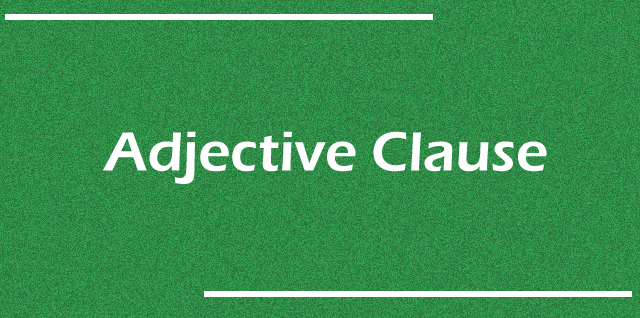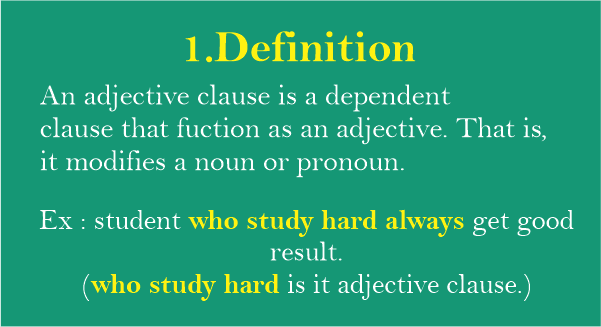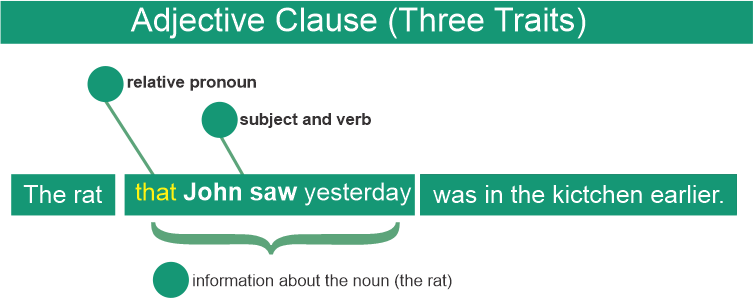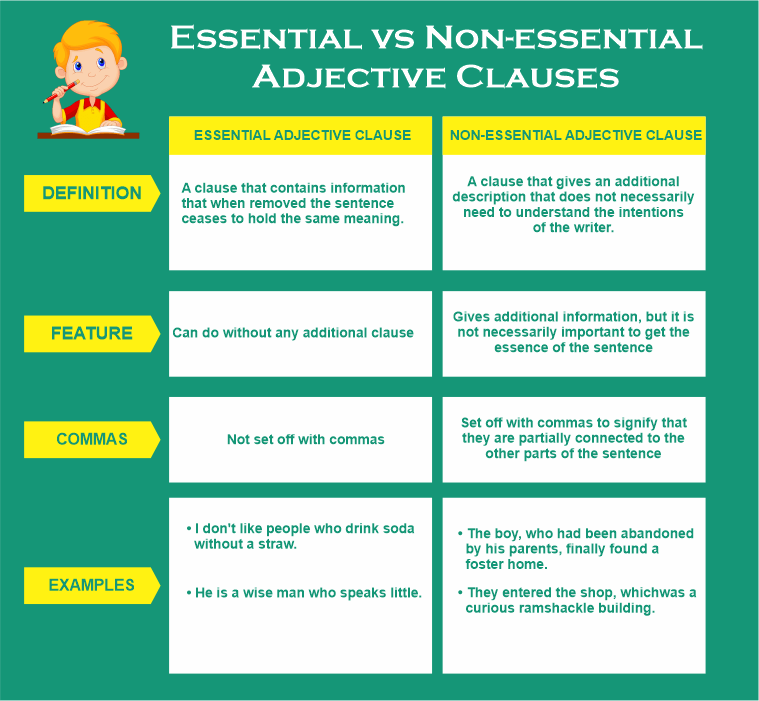Adjective ClauseThe adjective clause is a depending clause. It comprises a subject and a verb. Also, an adjective clause performs the same role as an adjective. 
What Exactly Is an Adjective Clause?Adjectival clauses are dependent clauses that act as an adjective in the sentences. These are also referred as the adjective clause. A subject and a verb are always present in an adjective clause. It cannot, however, exist alone as a complete or full notion. 
An adjective clause often starts with one of the below-mentioned words:
These clauses enable you to join two statements into one by utilizing relative pronouns 1. WHO (used for individuals as subjects ) My buddy missed the presentation + She borrowed Sandy's notebooks to study. My buddy, who missed the presentation, borrowed Sandy's notebooks to study. 2. WHOM (used for individuals as objects ) The student won by a score + Numerous individuals adore him. The student whom many individuals adore won by a score. 3. WHOSE (used to showcase the possession ) I respect my lecturer Simba + His phone was misplaced. I respect lecturer Simba, whose phone was misplaced. 4. THAT (utilized for individual, location, or object and presents details essential to describe the noun. ) I met an individual on the stop yesterday + He studies at the university.→ The individual that I met yesterday studies at the university. 5. WHICH (used for locations and things) provides more information about the already certain noun. ) My new vehicle requires very limited gas+ It was a present from my daughter. My new vehicle, which was a present from my daughter, requires very limited gas. Note: Whenever an adjective clause has additional information, it is separated by commas.6. WHERE and WHEN (utilized to substitute in which, on which, and so on , but not which ) July was sorrowful for me. + I left the house that month. In July, when I left the house, it was sorrowful for me. I have always desired to get a big home. + Jessica lives in that home. I have always desired to purchase a big home where Jessica lives. 7. WHY (typically showcases a noun clause) My niece didn't come, + I don't understand why. I don't understand why my niece didn't come. 
Adjective Clause InstancesThe young man whom you observed at the store attempted burglary. In this statement, the adjective clause serves as an adjective. The adjective clause characterizes the boy. It has a subject and a verb, "you observed," but it cannot exist on its own as a full thought. "Whom you observed at the store" is a partial statement. The concertgoers, who paid between $45 and $100, had to wait till the rain stopped. Similarly, the adjective phrase, in this case, characterizes concert goers. Some more Adjective Clause Examples Now that you understand what an adjective clause is, it may be useful to look at some instances of adjective clauses before delving into the specifics of adjective clause usage. Consider the following sentences that use adjective clauses.
So an adjective clause is a multi-word adjective that comprises both the subjects and the verbs. An adjective is typically thought of as an individual word employed in front of a noun to alter its meanings (e.g., big building, naughty kitten, obedient assistant). An adjective can, however, also take the format of an adjective clause. An adjective clause, like all clauses, follows after the noun(s) it changes and is composed of many terms, including the subject and the verb. 
Adjective Clauses' FunctionalityAdjective clauses act similarly to adjectives in that they alter nouns. Adjective clauses are useful in writing because they make them more precise and detailed. Using an Adjective Clause to Form a SentenceRead on to explore full adjective clauses, as well as an example of an adjective clause An adjective clause might help to make writing more precise. As a result, two distinct clauses can be joined to form a single full sentence. This fresh sentence will have both -i.e. an independent and dependent clause (the adjective clause). There are two independent clauses in the below-mentioned sentence: The flat is on the corner. I love the flat. To integrate these sentences, first, decide which separate clause to delete. For this example, we'll use the other sentence. Then, include the relative pronoun and relative adverb at the start of that phrase. So, it will be re-worded as The flat is on the corner, that I love the flat. Please note that the above sentence is grammatically incorrect but is just used as an instance to explain the integration. Within the initial independent clause, add the segment beginning with the relative pronoun/adverb between both the subject and verb. As a result, the statement will be The flat that I love is the flat on the corner. The object of the second statement, "the flat," is now superfluous in this statement. It must be deleted. Finally, the flat that I love is on the corner. The adjective clause "that I enjoy" now unites the two independent phrases that were previously separate. The Adjective Clause's ComponentsAn adjective phrase is made up of basic pieces that their common patterns can distinguish.
Elements of an Adjective ClauseA relative pronoun or relative adverb + subject + verb
Relative pronoun as subject + verb
Rules and Ways to Punctuate an Adjective ClauseAdjective clause punctuation: As adjective clauses are dependent clauses, these must be linked to a separate (main) clause. Commas are not required in restrictive adjective clauses (also known as essential adjective clauses) since they are needed to ascertain a non-specific subject. Restrictive Adjective Clause Example The kid won an award. The subject of this sentence is vague. Which kid took home the award? An adjective clause will provide the required information to determine which kid is being addressed.
The subject is now more explicit, thanks to the adjective clause. Nonrestrictive adjective clauses (also known as nonessential adjective clauses) need commas since they add details to an already specified subject. They add to the topic's knowledge, yet the particular subject is already known. Nonrestrictive Adjective Clause Example Example: Martha received a reward. The subject is specified in this statement. The readers are aware of who earned the reward. An adjective clause will offer further information about Mary. Mary, who performed a single, received the reward. The adjective clause now adds more information to the sentence. Subject and Verb in Adjective ClausesEach adjective sentence has a subject and a verb that functions together to explain the original noun being altered. For example, the clause "which many individuals like" comprises the subject individuals and the verb like, but it is not a full sentence on its own. Instead, it serves to expand on the noun candy in the sentence, "Candy, which many individuals like, is unhealthy." In some circumstances, the relative pronoun also acts as the clause's subject. For instance, Individuals who are intelligent obey the rules. In the sentence, the adjective clause is "who are intelligent," and the relative pronoun 'who' also serves as the subject. Adjective Clauses in Common UseExamine some more adjective clause instances. As you go through these, see if you can analyse and assess which of these are essential and which aren't. Consider whether the information is required for the sentence's meaning. Is punctuation necessary ?
So, in the sentences mentioned above, it is clearly evident that instances 3 and 4 are nonessential adjective clauses. Thus, including adjective clauses in your write-ups is an excellent approach to communicating more details about the nouns and pronouns. This additional information will enhance your work and help the readers better comprehend your opinions. When you grasp the concept of relative pronouns and how to distinguish between essential and nonessential clauses, you'll have no issue recognizing and punctuating adjective clauses in your work. Now it's time to practice your learnings!
Next TopicAdjective Clause Examples
|
 For Videos Join Our Youtube Channel: Join Now
For Videos Join Our Youtube Channel: Join Now
Feedback
- Send your Feedback to [email protected]
Help Others, Please Share









